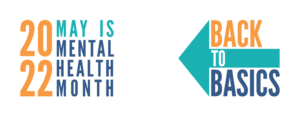
Mental Health Awareness has never been more important than this year.
This last year has been challenging, to say the least.
From the ongoing pandemic to the continuing injustices, it can be hard to get through the day without something in the news cycle feeling really difficult. And of course, what some people read about in the news, other people experience in real life.
We know that around half of all people in the U.S. will meet the criteria for a diagnosable mental health condition at some point in their lives. We also know that communities who are targeted by racism, homophobia, transphobia, sexism, and other forms of systemic oppression and violence can face an even heavier mental health burden because of these harms.
For this year’s Mental Health Month, which we proudly started in 1949, Mental Health America is taking our annual toolkit back to basics. Because no matter how heavy and hard the world feels – and maybe especially because the world feels quite challenging right now – focusing on our mental health must remain a priority. So we kept it simple. Our toolkit provides free, practical resources to introduce mental health topics like recognizing warning
signs, knowing the factors that can lead to mental health conditions, maintaining mental wellness, and seeking help for mental health.
#Tools2Thrive
Mental Health America of Putnam County (MHAoPC) is proud to share and explore topics that can help you build your own set of #Tools2Thrive. These areas include: recognizing and owning your feelings; connecting with others; finding the positive after loss; eliminating toxic influences; creating healthy routines; and supporting others – all as ways to boost the mental health and general wellness of you and your loved ones. We’re so happy to be able to share these!
Even More Online Resources
Online resources have really taken off recently. Our own, newly re-designed web site, mhaopc.org, has not only information on our programs, but links to these #ToolsToThrive, COVID-19 sites, and support services. Additionally, we would like to applaud Indiana state agencies for launching the new BeWellindiana.com website, where Hoosiers can find resources and services for mental health and substance use disorders, as well as take one of our mental health screens.
MHA – Nationally Recognized Screenings
Writing of screenings, we invite you take a quick snapshot of your mental health with one of many available. One of the easiest tools anyone can use is taking a mental health screen when they need answers. It’s a quick, free, and private way for people to assess their mental health and recognize signs of mental health problems. Screenings not only help you think about specific challenges, they can help you define specific issues and help others (e.g. surveys for Caregivers, Parents, and Better Care for Adults) . You can reach the screenings at mhascreening.org.
Practical tools are close by that everyone can use to improve their mental health and increase resiliency regardless of the situations they are dealing with. Don’t hesitate to reach out and research, evaluate, and engage. Remember, we’re all in this together, and our strength is working with each other.
For more information, visit all our Mental Health Month pages, and you can get even more from www.mhanational.org/july or by calling 765-653-3310.
July is BIPOC Month
(Black, Indigenous, Persons of Color)
What is BIPOC? By including “BI” Black and Indigenous in addition to “POC” people of color, we are honoring the unique experiences of Black and Indigenous individuals and their communities, as well as the spectrum of existence and experience by POC. This July, MHA has developed content that is both timely and hopefully evergreen. We have included many of these resources here on our web page for BIPOC Month.
A new 2022 toolkit will be released in July, but much information which MHA National has developed content for our previous BIPOC Mental Health Month toolkits that is both timely and hopefully evergreen, including:
- Links to updated information on our website;
- Lists of resources specifically for BIPOC and LGBTQ+ communities;
- Handouts on racism and mental health and racial trauma;
- An infographic built from MHA screening data on BIPOC and LGBTQ+ mental health;
- A Call to Action for people to share how discrimination and/or racism have affected their mental health using the hashtag #ImpactofTrauma;
- And more!
